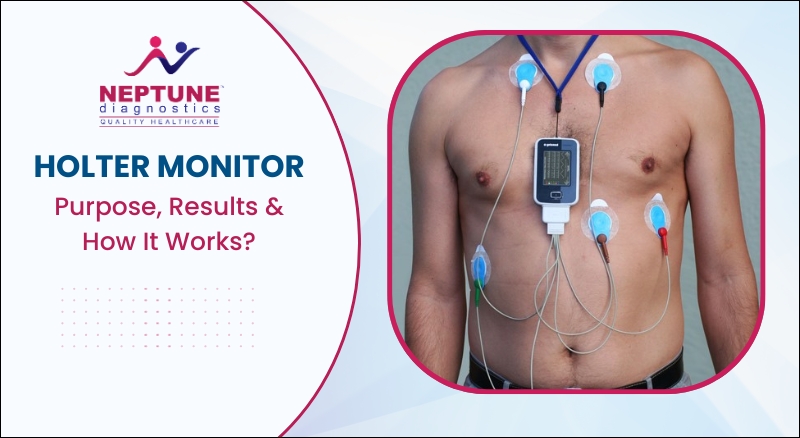Has your doctor recommended a Holter Monitor test, and you’re unsure what to expect? You’re not alone. While a standard ECG provides a quick snapshot of your heart’s activity, some heart issues are fleeting and don’t appear during a brief clinic visit. This is where a Holter monitor becomes an invaluable tool for cardiologists.
At Neptune Diagnostics Center, Ghatkopar, Mumbai, we use advanced Holter monitoring to provide a comprehensive picture of your heart health over time. Let’s demystify this essential cardiac test.
What is the Purpose of a Holter Monitor?
The primary purpose of a Holter monitor is to record your heart’s electrical activity (heart rate and rhythm) continuously for 24 to 48 hours, or even longer, as you go about your daily routine. It helps your doctor catch irregular heartbeats (arrhythmias) or silent, symptom-free heart issues that a routine electrocardiogram (ECG) might miss.
Your doctor may recommend this test if you experience symptoms like:
- Dizziness or fainting spells
- Unexplained palpitations or a racing heart
- Shortness of breath
- Chest pain
- To check the effectiveness of a pacemaker or heart medication
How Does a Holter Monitor Work?
The process is simple, painless, and non-invasive.
-
Setup at the Clinic: A technician will attach small, sticky patches called electrodes to your chest. These electrodes are connected by wires to a small, portable recording device—the Holter monitor itself.
-
Wearing the Monitor: You’ll be instructed on how to wear the device, typically on a belt or with a shoulder strap. You can go home and resume most of your normal activities, including sleeping and light exercise.
-
Keeping a Diary: This is a crucial part of the test. You will be given a diary to log your activities, symptoms, and their timings. For example, noting “climbed stairs at 10:15 AM, felt dizzy” helps your doctor correlate the data from the monitor with your specific experiences.
-
Returning the Device: After the monitoring period (usually 24-48 hours), you will return the device to our center in Ghatkopar. Our specialists will then analyze the vast amount of recorded data to generate a detailed report for your doctor.
Understanding Your Holter Monitor Results
The results will show a detailed analysis of your heart’s performance over the test period. Your doctor will look for:
- Arrhythmias: Irregular heartbeats like tachycardia (too fast), bradycardia (too slow), or premature contractions.
- Ischemia: Evidence of reduced blood flow to the heart muscle, which can cause silent heart attacks.
- Correlation: How your logged symptoms align with the heart’s electrical activity.
A normal result means no significant arrhythmias or ischemia were detected during the test period. An abnormal result will help your cardiologist diagnose a specific condition and create a targeted treatment plan for you.
Expert Holter Monitoring at Neptune Diagnostics Center, Ghatkopar
If you are looking for reliable and accurate Holter Monitor testing in Ghatkopar, Mumbai, trust the experts at Neptune Diagnostics Center.
Frequently Asked Questions (FAQs)
1. Can I take a bath or shower with a Holter monitor?
No, the device and electrodes are not waterproof. You must avoid bathing, showering, and swimming while wearing the monitor. Sponge baths are recommended.
2. Does wearing a Holter monitor hurt?
No, the test is completely painless. You might feel some minor skin irritation from the electrodes, but the device itself does not emit any sensations.
3. What should I avoid during the Holter test?
You should avoid getting the equipment wet, using an electric blanket, and standing near metal detectors or high-voltage areas, as they can interfere with the recording.
4. How long do you wear a Holter monitor?
The standard duration is 24 to 48 hours. In some cases, your doctor may recommend a longer-term event monitor for several weeks.
5. Is a Holter monitor the same as an ECG?
No. An ECG is a brief, 10-second snapshot of your heart’s rhythm taken in the clinic. A Holter monitor is a continuous recording over a much longer period, capturing what happens as you live your daily life.

